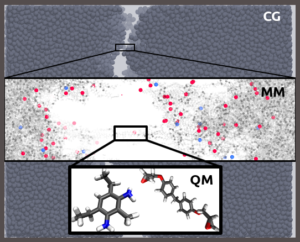HPC User Report from J. Konrad (Professorship of Theoretical Chemistry)
Modeling of epoxy resins: scale-bridging of formation and fracture dynamics
Polymer modeling across scales requires understanding in a broad spectrum of physical and chemical phenomena. Quantum mechanical (QM) calculations provide the basis for the formation of atomistic polymer networks on the nano-scale with respect to thermodynamics. Monitoring dynamic processes along fracture by means of molecular dynamics (MM) enable development of coarse-grained models (CG). Extrapolation methods and upscaling accomplish comparability to macroscopic properties.
Methods and codes
Quantum mechanics calculations for small molecules were carried out with Gaussian, in particular epoxy resin monomers with about 50 atoms, whereas molecular dynamics simulations for curing, relaxation and deformation with at least 50000 atoms were simulated by LAMMPS with GPU acceleration. Upcoming coarse-grained simulations with about one million particles, each reflecting the properties of a system containing 50000 atoms, are running with LAMMPS and the GPU package KOKKOS.
Results

We investigated the epoxy system of bisphenol F diglycidyl ether (BFDGE) and 4,6-diethyl-2- methylbenzene-1,3-diamine (DETDA) regarding the crosslinking reaction, as well as bond dissociation, by development of a dissociative Force Field, which facilitates our curing algorithm to reach the experimental crosslinking degree of 99% (1,2). The resulting, reliable models fulfill bulk, as well as elastic properties, we derived from linear response theory (3). Furthermore, we studied tensile deformation about inter-molecular reorganization processes along fracture processes and extrapolated occurring stresses to vanishing strain rates, which yielded in accordance with macroscopic specimens (2,3).
Outreach
We are currently up-scaling our developed model to the meso-scale, comprising simulation boxes in the range of nm, thus bridging several magnitudes of
time- and length-scales.
- Macromolecules, 2020, 53(22), pp. 9698–9705
- ACS Polym. Au 2021, 1, 3, 165–174
- AIMS Materials Science, 2021, 8(6), pp. 867–880
Researcher’s Bio and Affiliation
Julian Konrad obtained his bachelor and master degree in Molecular Science at Friedrich Alexander University in Erlangen (FAU). He is currently a PhD student in the group of Prof. Zahn at Theoretical Chemistry department and is member of the Graduiertenkolleg GRK 2423 FRASCAL at the FAU.
